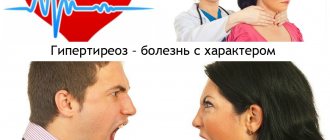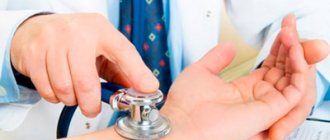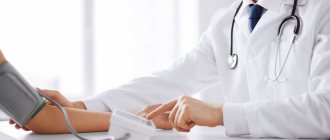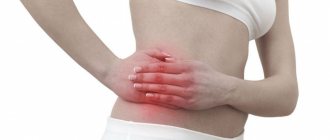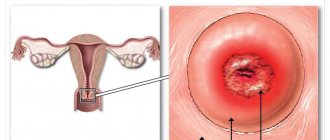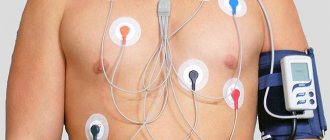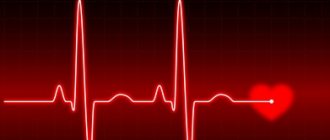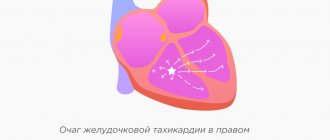Heartbeat
Palpitations - a feeling that the heart is beating too quickly or is beating too hard - is a reason to consult a doctor.
Heartbeat
is a patient complaint about the subjective sensation of a rapid, arrhythmic or heavy heartbeat. Normally, we do not notice our heartbeat. But any deviation from the norm becomes immediately noticeable. Patients typically describe palpitations as the following: the heart pounding too hard (or “loudly”) in the chest, the heart “jumping” out of the chest, pounding, “jerking,” “spinning,” or “fluttering.” Increased heartbeat may be accompanied by a feeling of pulsation in the neck, temples, pit of the stomach or fingertips. Palpitations may also be accompanied by tinnitus, pain in the heart area, a feeling of tightness in the chest or difficulty breathing. Such symptoms may indicate heart pathology, but in most cases, complaints of increased heartbeat with accompanying symptoms, instrumental studies do not reveal signs of heart damage.
Palpitations should be distinguished from tachycardia. Tachycardia
– this is an objective increase in heart rate. The normal heart rate for an adult at rest is 60-80 beats per minute. If more than 90 beats per minute are recorded, then tachycardia is diagnosed. However, the patient may not feel that his heartbeat is rapid.
Common causes of heart palpitations
Even a healthy person can feel increased heartbeat. This is most common for people with increased nervous sensitivity. The following can lead to heart palpitations:
- significant physical effort;
- rapid rise to altitude;
- physical activity in a hot and stuffy environment (lack of oxygen leads to increased heart function);
- sharp mental stress (fear, excitement, etc.);
- consuming large amounts of foods high in caffeine (coffee, tea, Coca-Cola);
- certain medications (in particular, cold remedies);
- digestive disorders (for example, flatulence, as a result of which the diaphragm appears slightly elevated).
Palpitations may be felt when the temperature is high (patients with a fever often feel palpitations).
Tachycardia is the main cause of severe pounding in the chest
The second most common heart disease is tachycardia. Normally, at rest in an adult, the number of beats per minute should be up to 80 times. But if you find that the number of beats is 100, then quickly make an appointment with a cardiologist. Due to intense work, the heart beats harder and, as a result, is more noticeable to a person.
If the number of beats exceeds this norm, this is one of the signs of tachycardia. Naturally, the disease negatively affects the functioning of the heart - the ventricles do not have time to fill with blood, so there is a deterioration in the blood supply to organs and tissues, and as a result, there is a lack of oxygen.
As a rule, the cause of tachycardia and a constant feeling of palpitations are excessive physical exertion, sunstroke, and diseases of the body, both infectious and viral. Treatment is very simple if you consult a doctor in time. If the necessary drug treatment is provided, heart problems should not arise. After a certain period, tachycardia, if left untreated, becomes chronic, which leads to a worsening of the condition, a person feels the heart beating more strongly, heart disease and inflammation of the myocardium appear.
To summarize, we determine that tachycardia is the main cause of a strong heartbeat, as a result of which a person can hear his own beats. From this we conclude that normally a person should not hear his own heartbeat.
Increased heart rate and high blood pressure
Increased heart rate is often accompanied by increased blood pressure. In this case, the more often the heart contracts, the higher the pressure in the arteries. The dependence here is exactly that... Therefore, it is wrong to consider high blood pressure as the cause of increased heart rate. Another thing is that increased blood pressure, accompanied by a general deterioration in well-being, can make you notice how hard your heart is beating.
Rapid heartbeat and increased blood pressure can be caused by the same reasons. In this case, therapeutic measures aimed at normalizing blood pressure will also help normalize the heartbeat.
Other reasons
Non-cardiological causes of palpitations in the chest also include:
- vegetative-vascular dystonia;
- anemia;
- neurosis;
- menopause;
- elevated temperature.
These diseases are accompanied by the following symptoms: dizziness, shortness of breath, suffocation, increased fatigue, sweating, chest pain. Treatment of these diseases is carried out by a specialist.
Increased heart rate and low blood pressure
An increased heart rate is quite possible even with low blood pressure. A sharp decrease in blood pressure can be observed during shock conditions (anaphylactic, traumatic, infectious-toxic, psychogenic and other types of shock). The body responds by speeding up the contraction of the heart muscle to restore blood pressure. A similar compensatory nature of increased heartbeat also occurs with large blood loss.
Atrial fibrillation
The most common abnormality in the field of cardiology is atrial fibrillation. It is determined by the following symptoms: the heart either stops, then starts beating sharply, as if you had just run a cross-country race. A person hears the sound of a heartbeat. The main symptoms also include difficulty breathing, dizziness, and chest pain. Often the disease is asymptomatic, which is a more dangerous condition for a person, because not diagnosed in time can cost health or even life.
If we talk about the physiological features of this disease, then instead of a full contraction of the atria, fibrillation occurs, that is, incomplete contraction, while the ventricles of the heart contract to 160 beats per minute. This is very dangerous for the heart, as it experiences incredible overload. The first symptoms may occur during times of stress. The consequences of the disease manifest themselves in the form of strokes, heart attacks and various heart diseases. If the sound of the heartbeat is noticeable even at rest, this is a serious signal from the body.
The main causes of arrhythmia are hereditary or congenital heart disease and valve disease. Another cause is coronary heart disease. Also, improper functioning of the organs responsible for hormones affects the heart muscle.
Like any disease, arrhythmia is better prevented than treated. Heart health is affected by a person's lifestyle. Play sports, get rid of bad habits that have a detrimental effect on the heart, worry less and you will never know what it means to feel your heartbeat in a calm state.
Rapid heartbeat with normal blood pressure
However, increased heartbeat can be felt regardless of blood pressure. The pressure may be low or normal, but the patient complains of palpitations. This is possible with vegetative-vascular dystonia, anemia, thyroid diseases and a number of other diseases. You should not try to determine what you are sick with, much less begin treatment only on the basis of comparing your heartbeat and blood pressure. In all cases when you are concerned about increased heart rate, you must undergo an examination as prescribed by your doctor.
Treatment of atrial fibrillation
Before starting treatment, it is necessary to determine the source of the disorder, namely with the interruption of which valve or ventricle it is associated with. It is necessary to completely examine the entire cardiovascular system. The course of treatment consists of lifelong observation by a cardiologist, drug treatment, and, in some cases, surgical procedures. Most often, arrhythmia is classified as a chronic pathology, and surgical intervention is rarely required. It is necessary for people with congenital heart disease and is performed in children under 14 years of age when drug treatment is ineffective.
When is palpitations a reason to see a doctor?
A rapid heartbeat is a reason to see a doctor if it:
- too intense;
- is protracted (does not go away for a long time);
- occurs with less and less exposure to the above factors;
- occurs independently of the above factors;
- is uneven in nature (arrhythmia can be assumed - a violation of the heart rhythm).
In these cases, rapid heartbeat may be a manifestation of serious disorders and diseases, such as:
- avitaminosis;
- anemia (low hemoglobin and iron in the blood);
- tetany (a condition caused by a lack of calcium);
- endocrine diseases;
- heart pathologies.
However, as a rule, in the case of myocarditis, other heart diseases, and hyperthyroidism, palpitations are not the main complaint. With such diseases, first of all, they complain of pain in the heart and shortness of breath.
It is necessary to react promptly if, against the background of increased heartbeat, dizziness, shortness of breath, pale skin, and sweating are observed. In this case, you should call an ambulance.
Psychological reasons
The main psychosomatic causes include:
- emotional stress;
- depression;
- panic attacks;
- stress.
Indeed, in an anxious state, a person’s heart begins to work faster, and consequently, symptoms such as sweating, tremors, shortness of breath appear, and, of course, the body gives a signal in the form of a palpable heartbeat.
If you feel your heart beating and all possible diseases have been ruled out, there is another way to solve the problem - eliminating stress and conflicts. If the cause of your palpitations is psychosomatics, then you should change your lifestyle. Give up stressful work, change or expand your social circle, try to eliminate any stress.
Consider adopting new healthy habits, such as walking in the fresh air, playing sports, or visiting health resorts. If possible, go to the sea to breathe the salty air. Take a course of massage, electrophoresis. Give up bad habits: smoking, drinking coffee or tea, energy drinks that stimulate the nervous system, and, of course, overeating. If your heart palpitations are caused by illnesses such as a panic attack or depression, consult a psychiatrist. These ailments are treated with medication.
How can a doctor help with a strong heartbeat?
If you have a complaint about palpitations, you should contact a general practitioner or cardiologist.
When a patient complains of increased heartbeat, it is first necessary to establish its cause - whether it is of physiological or pathological origin. For this purpose, laboratory and instrumental studies may be prescribed, including ECG, echocardiography (ultrasound of the heart), and radiography of the heart. After identifying the cause of the increased heart rate, a course of treatment is prescribed aimed at eliminating pathological factors. Normalization of the heartbeat is achieved through treatment with antiarrhythmic drugs. Such drugs should not be taken on your own; they should be prescribed by a doctor in accordance with the condition of your body, established on the basis of a medical examination. Otherwise, the treatment result may be negative.
Normal heart condition
Before we look at the main medical reasons why a person can feel their heartbeat, it is worth deciding how many heartbeats there should be on average per minute. The heart is a biological engine for the distillation of blood. In order to saturate the cells of organs with oxygen, the heart works continuously throughout life. It has three states: relaxation, atrial contraction and ventricular contraction. Normal heart rate is approximately 60-80 beats per minute.
Going beyond these indicators is a deviation. There are external reasons why the number of heart beats may increase or decrease. You can feel the heart beating just by putting your ear to your chest, or using a phonendoscope. You need to measure your pulse at rest. Before this, you need to clarify the patient’s well-being and his diagnosis. The pulse depends on the time of day, temperature and humidity, the mood and mental state of a person, and age.
As already mentioned, in an excited emotional state, the number of heart beats per minute in a person increases. When the temperature rises, the heart rate also increases, and when the temperature drops, it slows down. Children tend to have a much faster pulse than adults. It can be up to 120 beats per minute, but with age it decreases and at the age of 15, during teenage puberty, it returns to normal - 60 beats.
How to get rid of palpitations
In addition to special cases, there is general treatment. First of all, go to your local clinic and see a general practitioner, who will refer you for a general blood and urine test. After conducting these examinations, he can identify pathology in other organ systems, after which he will refer you to a cardiologist. He will conduct the following tests:
- Ultrasound of the heart;
- ECG;
- ECG with stress.
If abnormalities are detected, the doctor may refer you for the next test - heart monitoring for several days. The device will measure your pulse, blood pressure and breathing rate for 2-3 days, after which a diagnosis will be made based on the data.
It is also necessary to exclude complications of diseases, determine and make an accurate diagnosis. It is important to comply with therapy. If your health worsens, you should consult your doctor again. Most often, corticosteroids and cardio medications are prescribed for the treatment of cardiovascular diseases.
Speaking about the most popular tablets that are used to treat cardiovascular diseases, we need to name “Aspirin”, “Captopril”, “Nebilet”, “Panangin”. All medications should be taken only after a doctor's prescription. As for non-pharmaceutical methods of treating the heart, examples of effective herbal medicine are a decoction of valerian herb, mint tinctures and tea with chamomile flowers.
